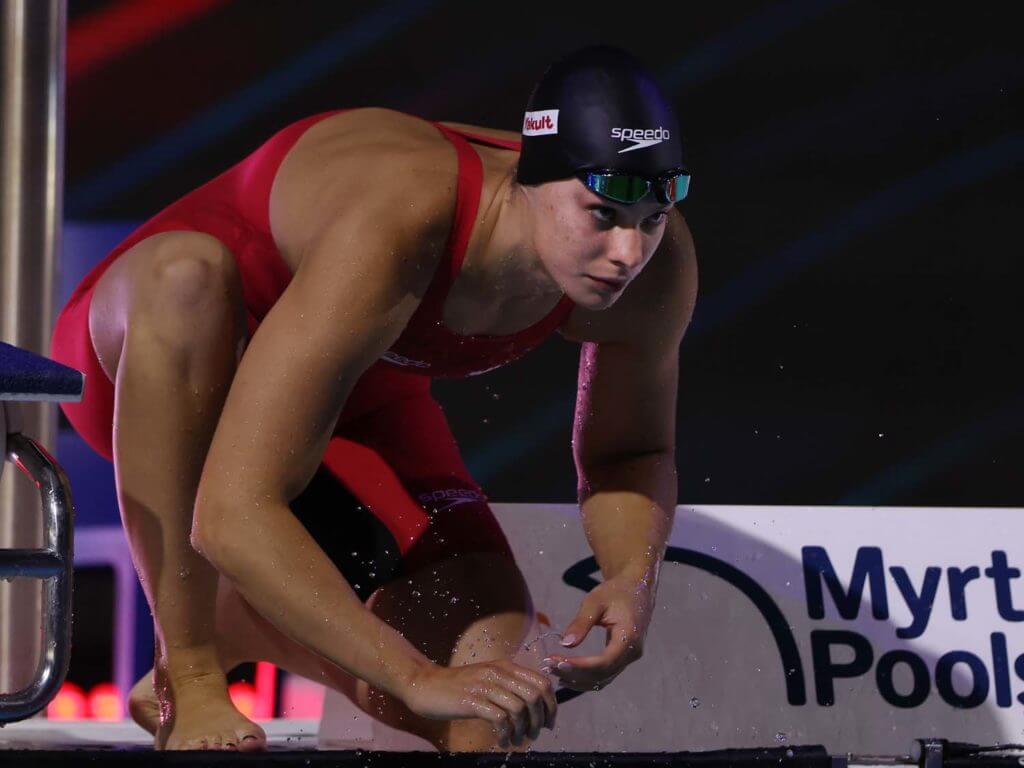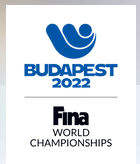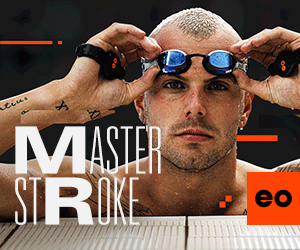Penny Oleksiak Still Spearheading Canadian Relay Excellence As Definitive Clutch Performer

Editorial content for the 2022 FINA World Championships coverage is sponsored by eo SwimBETTER.
See full event coverage.
Swim faster... faster, with game-changing data insight into your technique. eolab.com #eoSwimBETTER

Penny Oleksiak Still Spearheading Canadian Relay Excellence As Definitive Clutch Performer
Just 16 years old as she made her Olympic debut for Canada at the 2016 Games, Penny Oleksiak instantly became a national hero. Oleksiak won four medals in Rio, including gold in a dramatic 100 freestyle final as she tied with American Simone Manuel. No Canadian female swimmer had won a medal since 1996, and Oleksiak helped lead her nation to six women’s medals. Her gold was only the second in history by a Canadian woman, following Anne Ottenbrite’s win in the 100 breaststroke in 1984.
For her efforts, Oleksiak was named the winner of the prestigious Lou Marsh Trophy, which honors Canada’s top athlete for the year — in any sport, not just swimming. Oleksiak edged out the likes of Olympic sprinter Andre De Grasse and NHL star Sidney Crosby, who led the Pittsburgh Penguins to a Stanley Cup championship that year.
Remember, hockey is Canada’s No. 1 sport, and a teenage swimmer’s accomplishments were deemed more impressive than spearheading a championship team on the ice.
Since then, Oleksiak has never returned to that golden pinnacle. She has never won an individual medal at the World Championships. Instead, over the last six years, Oleksiak has been Canada’s glue swimmer, the stalwart performer in the best stretch of women’s swimming the country has ever produced.
Consider the Tokyo Olympics, where Oleksiak split 52.26 on the anchor leg of the 400 free relay to run down Manuel and secure silver for Canada, and then she matched that split anchoring her country’s medley relay to bronze. In between, Oleksiak captured the third individual Olympic medal of her career with an unexpected bronze in the 200 free, and she also placed fourth in the 100 free while eclipsing her gold-medal-winning time from five years earlier.
This year’s World Championships in Budapest brought two disappointing individual finishes for Oleksiak as she was disqualified in the 200 free semifinals for a false start and she placed fourth in the 100 free, a mere six hundredths off the podium. But the relays, on the other hand, gave the 22-year-old a chance to show off her poise and brilliance.
On Day One in the 400 free relay, Oleksiak swam the fastest anchor split (52.51) to pull away from the United States and win silver. Four days later, she nailed down bronze for Canada in the 800 free relay. Next up, Oleksiak was part of the mixed 400 free relay, and her two male teammates plus Kayla Sanchez did enough to set up Oleksiak for a big last leg, and she responded with a 52.11 split, the quickest of her career, to pull ahead of the Americans and win silver. Finally, Oleksiak was second-quickest on the anchor leg of the 400 medley relay as Canada earned bronze.
That’s four relay medals for Canada and four critical anchor legs for the star. Consider this: in the history of the World Championships, Canada has won 12 medals in women’s relays and mixed relays, and Oleksiak has been part of nine of those efforts.
These days, Oleksiak is no longer the face of Canadian swimming. That title surely goes to Summer McIntosh, a 15-year-old who won two individual world titles in Budapest (200 fly and 400 IM) plus another individual silver (400 free), while Kylie Masse and Maggie Mac Neil have both won individual World Championship titles. The relays, however, are the truest sign of a nation’s swimming might, and it’s easy to identify the swimmer who is the driving force behind all these relay medals.
Her place in the pantheon of Canadian athletes was secured in 2016, even before Oleksiak’s three Tokyo medals combined with her four from Rio gave her seven for her career, more than any other Canadian athlete in any sport. But going beyond the medal count, Oleksiak’s greatest legacy has been transforming Canada’s relays from occasional finalists to perpetual medalists. With Oleksiak on the anchor leg capable of matching or surpassing nearly anyone else in the world, Canada is never out of the race.






Great article.. paying homage to Oleksiak.. the story still continues I’m sure